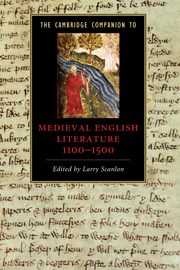Book contents
- Frontmatter
- Introduction
- Part I Contexts, genres, and traditions
- 1 Re-inventing the vernacular: Middle English language and its literature
- 2 Textual production and textual communities
- 3 Religious writing: hagiography, pastoralia, devotional and contemplative works
- 4 Romance
- 5 Dialogue, debate, and dream vision
- 6 Drama
- 7 Lyric
- 8 Lollard writings
- Part II Authors
- Guide to further reading
- Index
6 - Drama
from Part I - Contexts, genres, and traditions
Published online by Cambridge University Press: 28 November 2009
- Frontmatter
- Introduction
- Part I Contexts, genres, and traditions
- 1 Re-inventing the vernacular: Middle English language and its literature
- 2 Textual production and textual communities
- 3 Religious writing: hagiography, pastoralia, devotional and contemplative works
- 4 Romance
- 5 Dialogue, debate, and dream vision
- 6 Drama
- 7 Lyric
- 8 Lollard writings
- Part II Authors
- Guide to further reading
- Index
Summary
“Middle English Drama” is the conventional, if misleading, category referring to the textual remnants of a vast, expansive, very imaginative performative culture which was largely non-textual. Drama bespeaks authors who write it, theaters in which it might be produced, and conflicts explored in a room with the third wall removed. But the extant texts from the medieval tradition we call “dramatic” have no known authors, and no special, separate spaces in which they are produced. Middle English theater is likely to seem odd and inert when forced into these alien categories of analysis. We must consider it not as a separate aesthetic sphere, but rather, as part of the material organization of public life. Two scenes, both much anthologized, can stand as paradigmatic instances. The first scene can stand for medieval theater's interest in the actor's body as a primary medium of contemplation, interaction, and the creation of community; the second for the uses of theatrical prop as icon, index, symbol, figure.
There are twelve pageants in the York Corpus Christi cycle that concern the passion. These scenes are boisterous and busy (to take up the infectiously alliterative language of the plays), composed of multiple levels and tensions, and scenically enormously complex. But their still center is the York Crucifixion, in which Christ's body is ritually tortured in an agonizingly extended sequence culminating in the reconstruction on stage of the central icon of the culture - Christ on the cross, dramatically played as both reenactment of the crucifixion, and a construction of its central representation. Christ is nailed to the cross by a group of soldiers, played by pinners (makers of joining pegs) who mumble and joke about the arduousness of their labor, the labor that constitutes the only action of the play. This action relentlessly translates the theatrical principle that, working through the very medium of the actor’s body, the play must process time at the speed of the actor’s body.
- Type
- Chapter
- Information
- Publisher: Cambridge University PressPrint publication year: 2009



